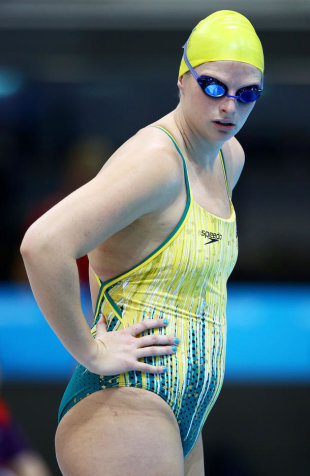Wednesday, July 31, 2013
Sunday, July 28, 2013
Saturday, July 27, 2013
Public pushback against ‘fat’ comments of Aussie swimmer Leisel Jones
Australian swimmer
People get mad. Real mad.
Not only did the Melbourne-based Herald-Sun suggest that four-time Australian Olympic swimmer Leisel Jones doesn't quite fill out her swimsuit as well as she did in prior Games, but editors published a poll asking if she was fit to swim in London. A photo caption in the paper read: "The Olympic veteran's figure is in stark contrast to that of 2008."
It didn't take long for seemingly everyone with an opinion on the matter — fellow Olympians, health advocates and the Twitterverse -- to come to her corner. Outrage pushed the paper to take down the poll in a matter of hours.
"I'm embarrassed by the Aussie media having a go at Leisel, one of Australia's greatest Olympians," fellow Aussie swimmer Melanie Schlanger tweeted "Support athletes don't drag them down."
"It's not very friendly or encouraging at this stage," former Australian sprinter Cathy Freeman told the Herald-Sun "I think it's very un-Australian, to be quite frank."
But, admittedly, she doesn't look like the same girl she used to when wearing a form-fitting swimsuit. The question that comes up is: Does it matter? Is it the media's place to question the fitness of an athlete who has already proved herself by making the team in the first place?
It makes headlines. And more eyes will certainly be on Jones when she does swim in London to see if she's anywhere close to her medal form of the past.
http://sports.yahoo.com/blogs/olympics-fourth-place-medal/public-pushes-back-against-fat-comments-aussie-swimmer-191640600--oly.html


Friday, July 19, 2013
Congrats to two of my favorite actresses!
It was announced today that two amazingly beautiful and wonderful actresses - who happen to be two of my fav's - were nominated for a 2012 Emmy Award! Way to go girls! Woot! Woot!
2012 Primetime Emmy Awards nominations
Outstanding Lead Actress in a Comedy Series:
Melissa McCarthy, "Mike & Molly" (CBS)
Supporting Actress in a Drama Series
Christina Hendricks, "Mad Men"
Christina Hendricks, "Mad Men"
Thursday, July 18, 2013
Another small step for women eating again!
 Images of models are in question.A controversial Israeli law banning too-skinny models went into effect with the start of 2013, prompting observers around the world to buzz about how much weight it will hold.
Images of models are in question.A controversial Israeli law banning too-skinny models went into effect with the start of 2013, prompting observers around the world to buzz about how much weight it will hold. The law, approved last March by Israel's legislating Knesset, requires models to prove they have maintained a Body Mass Index (BMI) of at least 18.5 for three months prior to a fashion shoot or show. That means a woman who is 5'8'' tall can weigh no less than 119 pounds. It also requires advertisers who thin out a model's body with retouching software to make it clear that they have manipulated the images.
"This law is another step in the war against eating disorders," said physician and law co-sponsor Rachel Adatto (with Danny Danon) after a 2011 reading of the draft, according to the Times of Israel. Underweight models, she explained, "can no longer serve as role models for innocent young people who adopt and copy the illusion of thinness."
But critics of the law in this country say it and others like it—the Madrid Fashion Show's ban on women whose BMI is below 18, for example, and Milan's Fashion Week's ban on models with a BMI below 18.5—are misguided, focusing on weight instead of health. They also say the Israeli ban is bound to fail because of the muscle of the fashion industry.
"I think it's an approach that isn't going to work," eating disorder expert Susan Ice told Yahoo! Shine. Ice, vice president of clinical services at Renfrew Center, a pioneer in the treatment of eating disorders, worked with the Council of Fashion Designers of America (CFDA) to create guidelines for models which, rather than focusing on BMI, strive to educate the industry and foster a healthy working environment.
"I think that's a much more enlightened approach, a more likely-to-succeed approach, and an empowering approach," Ice says. Plus, she says, through working with the CFDA, "I've learned that designers are really artists, and we have free speech here. We can't tell anyone how to do their art….If designers want women to look like boys or if designers want women to look like 8-year-olds, you're not going to change that."
But a champion of the new law, Adi Barkan, a former fashion-model agent in Israel, told Tayla Minsberg of the Atlantic last year that he was drawn into the issue after meeting an aspiring model who looked like she needed to be hospitalized. "I became immersed in this world very quickly. I gave up the agency and photography and delved into the dark world of anorexics and bulimics," he said. "I realized that only legislation can change the situation. There was no time to educate so many people, and the change had be forced on the industry. There was no time to waste, so many girls were dieting to death."
Others in the industry around the world have agreed, including the organizers of the fashion shows in Italy and Spain. Years ago, the lower house of French Parliament voted in favor of a vague bill that outlawed "publicly inciting extreme thinness." And, in 2011, the UK banned a web-based ad that used a model with "highly visible" ribs, calling it "socially irresponsible." Vogue, at its magazines globally, instituted guidelines last year that enforce weight and age guidelines for its top models.
Still, wrote Ray A. Smith and Christina Binkley in the Wall Street Journal this week, "The efforts to regulate models' weight in Spain and Italy have not resulted in significant changes, in part because of difficulties in determining reliable methods of measuring weight and health."
Still, folks including Ice say there's no denying that images from Hollywood and the fashion industry can be difficult for young women to deal with. "Certainly I don't believe the modeling industry has caused the rise in eating disorders, but it makes it harder," she says. "It's a difficult recovery environment, worshiping thinness as the beauty ideal."
Wednesday, July 10, 2013
Talk about an inspiring story! My youngest is 10 and I'm still not willing to do this!
Kerri Walsh Jennings Nude in ESPN's Body Issue: Before and After Baby
By Sarah B. Weir, Shine Senior Writer | Healthy Living – 5 hours ago
Kerri Walsh Jennings is considered one half of the
best beach volleyball team in history. She's also a working mom who
captured the Olympic gold when she was five weeks pregnant with her
third child. She jumps, spikes, and dives in a minuscule bikini and say's it's "empowering." But still, the Amazonian athlete admits she was "sweating bullets" on the way to her nude portrait session for ESPN's annual Body Issue just nine weeks after giving birth.
"I was really, really nervous," the 34-year-old told People magazine. "I felt exposed, not just physically, but with all of my insecurities." On June 25, the day of the shoot, she tweeted, "One of the scariest things I've ever done!"
 Kerri Walsh Jennings (Photo: Richard Phibbs ESPN The Magazine)
Kerri Walsh Jennings (Photo: Richard Phibbs ESPN The Magazine)
She said, "For the first shoot, I was very pregnant, and that wasn't as
scary. I thought it would be, because I was big and rotund when I'm
usually the opposite, but it was really comfortable because I felt
almost like I was in costume," in an interview with ESPN.
"But for the second, I was two and a half months out from having a
baby. I'm supposed to be tight and toned and strong, but I have a lot
more work to do."
Walsh had nothing to worry about. The Body Issue is usually an oogle-fest of sports hunks and babes. But Walsh Jennings's portrait (actually double portrait; it's a split image of her when she was pregnant and then postbirth holding her newborn girl, Scout Margery) presents her as maternal goddess-meets-superheroine. And that's exactly how she felt giving birth.
"Having babies — literally delivering a baby — makes me feel like
Wonder Woman," she said. "Everything else seems minor compared to the
soul-shaking thing that is labor." While she adds that she can be
critical of her body and has been squatting and lunging like crazy to
get her famously sculpted "tushy" back, becoming a mom made her love her
body more than any win or medal. "I respect my body more than I have in
my life. It's not perfect, but I can't tell you how proud I am of my
body."
Becoming a mother also helped Walsh Jennings
up her game. Before she had kids, she "would eat, breathe, sleep with
my career in mind, and it was overkill. When you hold onto something too
tightly, you can suffocate it. Now I enjoy my career more, which allows
me to play better."
Being photographed for the Body Issue helped motivate Walsh to get back into shape quickly — although she didn't have far to go in terms of baby weight. She gained only 36 pounds
— a healthy number for her tall, lean frame. Her doctor permitted her
to start training after four weeks in order to allow her to heal fully,
though she says she cheated and started light workouts at about two
weeks. Being pregnant or a mom has never slowed Walsh down. She trained
and competed through all three pregnancies (her two sons Joseph, 4, and
Sundance, 3, were born in the interim between Beijing and London), so
it's not surprising that she jumped the gun.
Walsh has more challenges ahead. She starts the tournament circuit
at the end of July paired with two new players—first, Whitney Pavlik and
then April Ross, since Misty May-Treanor retired after the London
Olympics. And it wouldn't be a shocker if Walsh Jennings went on to have
a fourth kid and still rule the sand in Rio 2016. "We might want babies
down the road," she hinted to EPSN.
Friday, July 5, 2013
Join ... come on... I know you want to!!
Subscribe to:
Posts (Atom)








